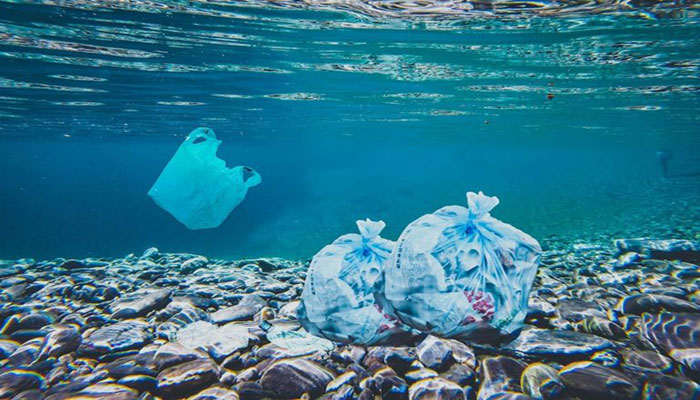Unmanaged solid waste affecting quality of urban life, harming the poor: study
Unmanaged solid waste causes deterioration in the quality of urban life, ruining the landscape, filling oceans and harming the poorest of poor in the shape of vector diseases, malaria, asthma issues, and ultimately affecting the environment and damaging marine life.
Sumayya Sajjad, project director Tearfund, said at an event held on Friday to launch a study aimed at estimating the household solid waste generation, composition and characterisation, and understanding the community perception and practices of solid waste management.
UK-based agency Tearfund, under a solid waste management & recycling project funded by UKAID, conducted the study. For the study, Murad Memon and Moinabad union committees of District Malir and Saeedabad and Naval Colony of District Keamari were selected.
The study shows that poor waste management causes different problems such as health issues, including malaria and diarrhea. No waste management causes flies, insects, pollution, allergy and open dumping waste in vacant plots, streets and nullahs.
It has suggested waste collection on time, drain management, anti-fly sprays, provision of community dustbins, government sweepers, anti-mosquitoe sprays, proper collection services and transport.
The study shows that waste generation per house per day in District Malir is 1.44 kg in Murad Memon UC and 1.13kg a house a day in Moinabad UC. In District Keamari. Its 1.22kg per house a day in Saeedabad UC and 0.86kg a house per day in Naval Colony UC.
The results also show that around 50 per cent of the community is not aware of proper solid waste management. The majority of households do not use trash bags, practise self-deposing, and do not segregate household waste.
12,000 tons a day
At the event, Jonathan Johnson, country director Tearfund Pakistan, said that Karachi generates approximately 12,000 tons of solid waste every day.
“We are running a solid waste management and recycling project, which is based on reducing, recycling and reusing waste in the city,” he said.
In the first phase, Johnson said that the organisation has been working in two union committees of District Keamari, and two union committees of District Malir, partnering with the Sindh Solid Waste Management Board (SSWMB).
Having a virtual discussion, Dr Wolf-Peter Schmidt from the London School of Hygiene and Tropical Medicine elaborated on the effect of solid waste collection on exposure to environmental risk factors in poor urban settlements in Karachi.
Presenting key findings of the waste composition analysis study, Dr Saffar Korai, a professor of Mehran University Jamshoro, said 61 per cent of the green waste was recorded in Saeedabad of District Keamari, and the lowest 42 per cent in Murad Memon UC, whereas the highest and the lowest
proportion of recyclable waste was recorded as 38 per cent and 25 per cent in the household waste of Murad Memon UC, and Naval Colony UC of District Keamari, respectively.
Dr Muhammad Ali Nizamani said the study shows that more than 90 per cent of the population doesn’t segregate waste at the household level, which goes to the landfill without any recycling process.
Presenting the learnings of the study, Asher Loyal from Tearfund expressed that the majority of the people dispose of household waste on a daily basis, and the probability of waste segregation at the source remain high if facilitated.
Rizwan Jaleel, Manoj Kumar, and Eleazer Ronald from Tearfund, Ishaq Soomro, officials of the Sindh Environmental Protection Agency, Research Fellows of Mehran University Jamshoro, local community members, media personnel, youth activists, and other social activists joined the event.
-
 New Guest Host Announced For The Kelly Clarkson Show
New Guest Host Announced For The Kelly Clarkson Show -
 Why Prince William’s Statement Over Jeffrey Epstein ‘says A Lot’
Why Prince William’s Statement Over Jeffrey Epstein ‘says A Lot’ -
 Paul McCrane Reveals Why Playing Jerks Became His Calling Card
Paul McCrane Reveals Why Playing Jerks Became His Calling Card -
 Prince William, Kate Middleton Thrashed For Their ‘bland’ Epstein Statement
Prince William, Kate Middleton Thrashed For Their ‘bland’ Epstein Statement -
 Bad Bunny Stunned Jennifer Grey So Much She Named Dog After Him
Bad Bunny Stunned Jennifer Grey So Much She Named Dog After Him -
 Kim Kardashian's Plans With Lewis Hamilton After Super Bowl Meet-up
Kim Kardashian's Plans With Lewis Hamilton After Super Bowl Meet-up -
 Prince William Traumatised By ‘bizarre Image’ Uncle Andrew Has Brought For Royals
Prince William Traumatised By ‘bizarre Image’ Uncle Andrew Has Brought For Royals -
 David Thewlis Gets Candid About Remus Lupin Fans In 'Harry Potter'
David Thewlis Gets Candid About Remus Lupin Fans In 'Harry Potter' -
 Cardi B And Stefon Diggs Spark Breakup Rumours After Super Bowl LX
Cardi B And Stefon Diggs Spark Breakup Rumours After Super Bowl LX -
 Alix Earle And Tom Brady’s Relationship Status Revealed After Cosy Super Bowl 2026 Outing
Alix Earle And Tom Brady’s Relationship Status Revealed After Cosy Super Bowl 2026 Outing -
 Why King Charles Has ‘no Choice’ Over Andrew Problem
Why King Charles Has ‘no Choice’ Over Andrew Problem -
 Shamed Andrew Wants ‘grand Coffin’ Despite Tainting Nation
Shamed Andrew Wants ‘grand Coffin’ Despite Tainting Nation -
 Keke Palmer Reveals How Motherhood Prepared Her For 'The Burbs' Role
Keke Palmer Reveals How Motherhood Prepared Her For 'The Burbs' Role -
 King Charles Charms Crowds During Lancashire Tour
King Charles Charms Crowds During Lancashire Tour -
 ‘Disgraced’ Andrew Still Has Power To Shake King Charles’ Reign: Expert
‘Disgraced’ Andrew Still Has Power To Shake King Charles’ Reign: Expert -
 Why Prince William Ground Breaking Saudi Tour Is Important
Why Prince William Ground Breaking Saudi Tour Is Important




